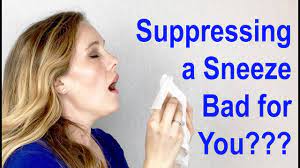“Health Risks Of Suppressing Sneezes”

Welcome to theustales.com.
Introduction:
Sneezing is a common bodily function, but have you ever wondered why we sneeze and what happens when we hold in a sneeze? In this article, we’ll explore the science of sneezing and address some common questions related to sneezing.
How the Sneeze Reflex Works:
The sneeze reflex is a natural protective mechanism of the body. It serves to expel irritants from the nasal passages and throat. When your body detects an irritant, such as dust, pollen, or foreign particles, it triggers the sneeze reflex to forcefully clear the airways. Here’s a breakdown of the steps involved:
Irritant Detection: When irritants are detected by receptors in the nasal passages, these receptors send signals to the brain. The brain processes this information and initiates the sneeze response.
Deep Inhalation: The reflex begins with a deep inhalation. The purpose of this inhalation is to bring in a significant volume of air into the lungs.
Closure of Eyes and Mouth: In many cases, the eyes involuntarily close during the initial phase of a sneeze to protect them from potential irritants. The mouth often remains open during this process.
Buildup of Pressure: The diaphragm, chest muscles, and abdominal muscles contract, creating a sudden increase in intra-thoracic pressure. This pressure buildup is a crucial component of the sneeze mechanism.
Sudden Release: The pressure release is rapid and forceful. The air, along with any irritants, is expelled forcefully through the nose and mouth.
Now that we have an understanding of how sneezing works, let’s address the specific questions regarding the health risks of suppressing sneezes:

Common Questions About Sneezing:
Let’s address some common questions related to sneezing:
-
Can holding in a sneeze kill you?
Holding in a sneeze may not typically be life-threatening. However, suppressing a sneeze can lead to increased pressure in the nasal passages and throat, potentially causing discomfort or, in extremely rare cases, injury to blood vessels or the eardrum. These severe problems are exceptionally rare.
-
Dangers of sneezing too hard!
While sneezing is a normal bodily function, sneezing too hard can carry some risks. It can lead to muscle strain, especially in the chest and back. Additionally, if you have an underlying medical condition like a hernia, it’s possible that a forceful sneeze could worsen the condition.
-
If you hold a sneeze, does it kill brain cells?
The myth that holding in a sneeze can kill brain cells is not accurate. There is no scientific evidence to support this claim. Suppressing a sneeze might create discomfort, but it does not harm brain cells.
-
Side effects of holding in a sneeze!
Holding in a sneeze can cause increased pressure in the nasal passages and throat, leading to potential ear or sinus pain, and, in extremely rare cases, injury to blood vessels or the eardrum. Discomfort is a common side effect of holding in a sneeze.
-
Side effects of sneezing too much!
Frequent sneezing can be a sign of an underlying issue, such as allergies or an infection. It can lead to nasal congestion, fatigue, and even chest discomfort due to the constant force of sneezing. If you’re experiencing excessive sneezing, it’s advisable to consult a healthcare professional for a proper diagnosis and treatment.
-
I accidentally held in a sneeze!
Accidentally holding in a sneeze can happen to anyone, and it’s not usually a cause for concern. Our reflexes sometimes lead us to suppress sneezes in situations where it might not be socially appropriate to sneeze. While it might not have severe immediate consequences, it’s essential to allow your body to sneeze when necessary to prevent potential health risks.
-
How to stop holding in sneezes!
To avoid suppressing sneezes, it’s essential to create an environment where you feel comfortable letting them out. Proper etiquette and hygiene are key to preventing the spread of illnesses while still allowing your body to function naturally. When you feel a sneeze coming on, simply allow it to happen naturally, or use your elbow or a tissue to minimize the spread of germs.
Conclusion:
Sneezing is a natural and essential bodily function that protects our respiratory system from potential irritants. Whether you’re a child or an adult, it’s important to allow your body to sneeze when necessary. So the next time you feel a sneeze coming on, embrace it as your body’s way of staying healthy and safeguarding your respiratory system.
That’s it for now.
Share your love in the comments.
We are theustales – be with us for more updates on theustales.com.
Also Read:
The Perils of Prolonged Phone Use on the Toilet: A Deep Dive into Health Risks


calisthenics xyandanxvurulmus.wlQiwjJdF0kB